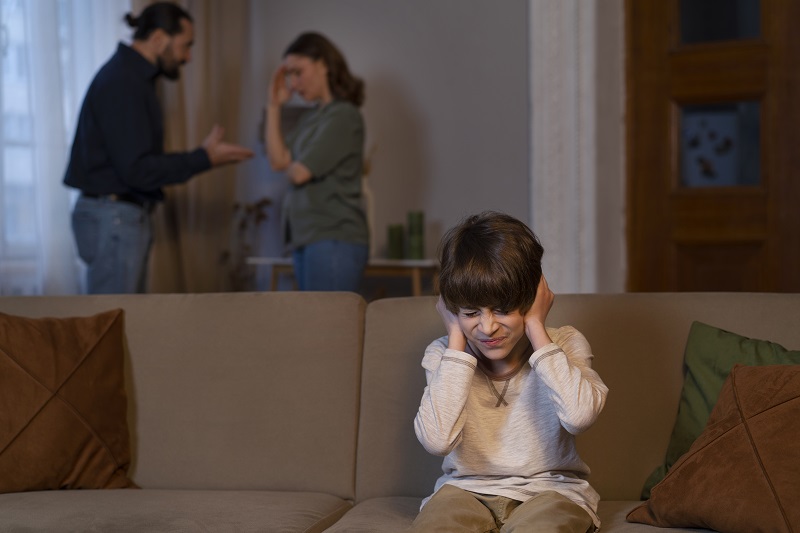
Signs of Poor Parenting and How to Avoid Them
Parenting is one of the most critical and challenging roles in any person’s life. While there is no one-size-fits-all guide to being a perfect parent, certain behaviors and patterns can indicate poor parenting, which may negatively impact a child’s development. Poor parenting can lead to a variety of issues, including emotional, social, and behavioral difficulties for children. Understanding these signs is crucial for every parent to ensure they are providing a nurturing, supportive environment for their children to grow and thrive.
What is Bad Parenting?

Bad parenting refers to a range of behaviors and attitudes exhibited by a parent that are detrimental to the child’s physical, emotional, and psychological well-being. These behaviors may include neglect, over-controlling, inconsistent discipline, lack of emotional support, and abusive practices. Bad parenting can significantly affect a child’s development and hinder their ability to develop healthy self-esteem, emotional regulation, and positive social interactions.
When parents fail to provide a stable and nurturing environment, children may struggle to develop essential life skills and emotional intelligence. This can result in long-lasting consequences, both in childhood and into adulthood, affecting mental health, relationships, and success in various areas of life.
What are the signs of bad parenting?

- Lack of Emotional Support
One of the most significant signs of poor parenting is a lack of emotional support. Children require emotional validation and security from their parents to build healthy self-esteem and a sense of trust in others. If a child feels neglected, emotionally dismissed, or unsupported by their parents, they are more likely to struggle with low self-worth and difficulty in forming healthy relationships later in life.
Parents should be attuned to their child’s emotional needs, offering praise, encouragement, and validation. Actively listening to children, acknowledging their feelings, and offering comfort during challenging times can foster emotional security. Positive reinforcement and providing a safe space for children to express themselves can go a long way in nurturing a child’s emotional well-being.
- Excessive Control and Over-Parenting
Excessive control is another sign of poor parenting. When parents micromanage every aspect of their child’s life, it often leads to feelings of frustration, resentment, and a lack of independence in the child. Over-controlling parents may dictate their child’s actions, limit their choices, or not allow them to make mistakes, which can hinder the development of essential life skills such as decision-making, problem-solving, and responsibility.
While it’s important to guide children, it’s equally important to allow them the freedom to make their own choices within appropriate boundaries. Parents should encourage independence and give their children the opportunity to learn from their mistakes. Offering support when needed while allowing children to make decisions can help them develop confidence and autonomy.
- Inconsistent Discipline
Inconsistent discipline is a common trait in poor parenting, where parents alternate between being too strict and overly lenient, confusing the child. Children require clear and consistent boundaries to understand what is acceptable and what is not. Inconsistent discipline can lead to confusion, behavioral issues, and an inability to respect authority.
Setting clear, consistent rules and expectations is key to good parenting. Parents should establish reasonable boundaries and stick to them, ensuring that consequences for misbehavior are consistently applied. It’s also important to balance discipline with compassion, recognizing the child’s needs and feelings while maintaining structure and order.
- Lack of Communication
Effective communication is vital for a healthy parent-child relationship. Poor parenting often involves a breakdown in communication, where parents fail to listen to their children or communicate effectively. This lack of communication can lead to misunderstandings, feelings of alienation, and children becoming less likely to seek advice or help from their parents.
Parents should actively listen to their children, creating an open line of communication. It’s essential to encourage conversations where children feel safe to express their thoughts, opinions, and concerns without fear of judgment or punishment. Regular family discussions can help children feel heard and valued, fostering trust and respect.
- Neglecting the Child’s Needs
Parental neglect is a form of poor parenting that can have devastating effects on a child’s development. Neglect can take many forms, from physical neglect (e.g., not providing adequate food, clothing, or shelter) to emotional neglect (e.g., failing to provide affection or attention). This type of parenting can severely affect a child’s emotional and physical well-being, leading to developmental delays, social problems, and mental health issues.
Parents should prioritize their child’s basic needs, including food, clothing, shelter, and emotional care. They must also recognize the importance of spending quality time with their children, offering affection and attention to foster healthy attachment and development. Recognizing when professional help is needed (e.g., counseling or therapy) can also be crucial in addressing deeper emotional needs.
- Favoritism or Unfair Treatment
Favoritism, where one child is treated more favorably than others, is another sign of poor parenting. This behavior can lead to sibling rivalry, resentment, and feelings of inadequacy in the child who is less favored. It can also undermine the development of strong family relationships, causing division and distress.
Parents should treat all their children fairly and equally, recognizing and celebrating their individual strengths and needs. It’s important to show love and affection to each child and avoid comparing them to one another. When children feel equally valued, they are more likely to develop a positive self-image and strong family bonds.
- Emotional or Physical Abuse
Any form of emotional, physical, or verbal abuse is a clear sign of poor parenting and can have long-lasting effects on a child’s mental and physical health. Abuse can cause deep emotional scars, including anxiety, depression, and an inability to trust others. It is essential for parents to recognize that abuse in any form is never acceptable and can lead to lifelong consequences for their child.
Parents should strive to create a nurturing environment where respect and kindness are central to their interactions. Seeking help if anger or stress leads to aggressive behavior is important for both the parent and child’s well-being. Therapy or counseling can be beneficial in addressing underlying issues and fostering healthier communication patterns.
- Involvement in Child’s Peer Relationships
A sign of poor parenting is when parents excessively control or interfere with their child’s peer relationships. While guidance is important, overly controlling a child’s friendships can lead to isolation and poor social development. Children need the freedom to form their own relationships, learn conflict resolution, and develop social skills.
Parents should support their children’s friendships and encourage them to build social connections but avoid micromanaging their interactions. Offering guidance when necessary, such as helping children navigate conflicts or make positive choices, is beneficial. Encouraging socialization and extracurricular activities can also promote positive peer relationships.
- Overindulgence
Overindulgent parenting, where parents give their children whatever they want without setting boundaries, is another sign of poor parenting. This behavior can lead to children feeling entitled, spoiled, and unappreciative. They may struggle with emotional regulation and develop unrealistic expectations about life.
Parents should teach their children the value of hard work, gratitude, and responsibility. Setting limits and encouraging children to earn privileges can help them develop a strong work ethic and respect for others. It’s important to balance affection and generosity with discipline and guidance.
- Lack of Role Modeling
Parents play an essential role as role models for their children. If parents fail to model positive behaviors, such as respect, honesty, and responsibility, their children may struggle to develop these traits. Poor parenting often involves setting a poor example, which can result in children mimicking negative behaviors.
Parents should model the behaviors they want to see in their children. Practicing honesty, empathy, and respect can set a strong example for children to follow. When parents demonstrate positive behaviors, children are more likely to adopt these behaviors themselves.
How Poor Parenting Can Harm Your Children:

The consequences of poor parenting are far-reaching and can have a profound impact on a child’s psychological, emotional, and social development. Below are some of the psychological and emotional harms poor parenting can cause:
Psychological and Emotional Impacts of Poor Parenting:
Low Self-Esteem: Children who are neglected or constantly criticized may develop poor self-esteem. They may feel inadequate or unworthy of love and attention, which can affect their confidence and sense of self-worth.
Emotional Instability: Children raised in emotionally neglectful or abusive environments often struggle with emotional regulation. They may experience mood swings, anxiety, and depression, and have difficulty managing stress or handling relationships.
Difficulty in Forming Relationships: Lack of emotional support, inconsistent discipline, or abusive behavior can lead to attachment issues. Children may struggle to form healthy relationships with peers, teachers, and future partners due to mistrust and fear of rejection.
Behavioral Problems: Children of controlling or neglectful parents may exhibit disruptive behavior, act out, or become overly dependent on others. They may struggle with authority, making it difficult to function in social and academic settings.
Increased Risk of Mental Health Issues: Prolonged exposure to poor parenting can increase a child’s risk of developing mental health problems, including anxiety, depression, PTSD, and personality disorders.
Conclusion
Recognizing the signs of poor parenting is the first step toward fostering a healthier, more supportive relationship with your children. By avoiding these common mistakes and adopting positive parenting practices, parents can ensure they are providing the best possible environment for their child’s development. Parenting is a continuous journey of growth and learning, and understanding the impact of your actions is essential to raising well-adjusted, confident, and compassionate children.





